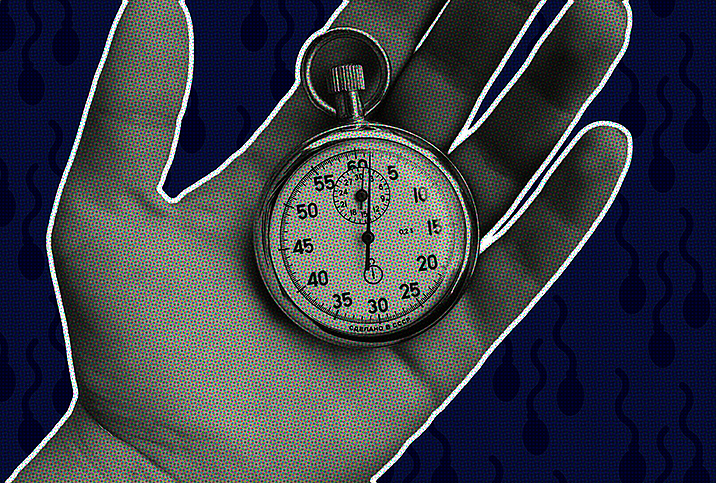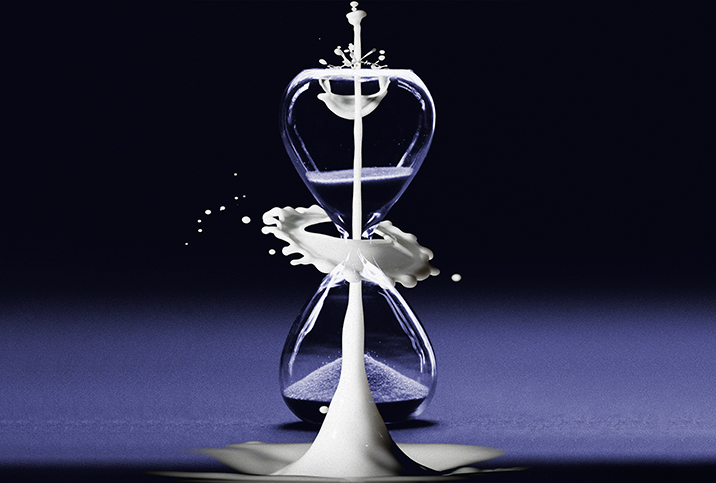When Does Premature Ejaculation Become a Problem?

Let’s skip the foreplay and get right to the technicalities: The average guy ejaculates after four to five minutes, according to the Mayo Clinic. Ejaculating any sooner than that is likely to wreak havoc on a guy’s psyche—just think about how Missy Elliott immortalized the "One Minute Man."
But coming too soon is not uncommon: Every guy has the occasional instance of overexcitement, but about one in three American men between 18 to 59 years old have more persistent problems with premature ejaculation (PE), according to the Urology Care Foundation. By definition, this means you’re either having an orgasm before intercourse or it’s happening less than two minutes after you start having sex, said Tobias Kohler, M.D., a urologist and professor of urology at the Mayo Clinic in Rochester, Minnesota.
There are two types of premature ejaculation: lifelong and acquired. The former is a result of a genetic predisposition, Kohler said, “but it’s not very common for fathers and sons to have a conversation about this. In general, guys don’t tend to know this sort of thing about their family history.”
On the other hand, acquired premature ejaculation is when you start climaxing early at some point in your life after previously normal ejaculation experiences, according to a 2016 report in the journal Translational Andrology and Urology. If this is the case, your doctor will want to know if something has changed in your life (physically or psychologically) that might be prompting this to occur, Kohler said.
Biological factors that can contribute to premature ejaculation include abnormal hormone levels and neurotransmitters in the brain, according to the Mayo Clinic. Acquired PE can also be attributed to erectile dysfunction and occasionally prostatitis (swelling and inflammation of the prostate gland), hyperthyroidism or withdrawal/detoxification from prescribed or recreational drugs, as per 2016 research published in Translational Andrology and Urology.
One in three American men between 18 to 59 years old have persistent problems with premature ejaculation.
But premature ejaculation is just as likely to be happening for psychological reasons. Anxiety, for example, can activate the sympathetic nervous system, leading to earlier ejaculation, and concerns about sexual performance and potential sexual failure might distract a guy from monitoring his level of arousal, leading him to come too soon. “Perhaps you’re stressed, you have a new partner or a higher level of excitement,” said Kohler. “All of this can contribute to ejaculation changes.”
Whatever the cause, premature ejaculation deserves more attention: A study published in the Journal of Sexual Medicine found that PE received less consideration and attention from healthcare providers than erectile dysfunction, although it can be just as difficult to deal with. “The stress men feel when it comes to sexual performance can be very debilitating and can lead to a lot of problems in terms of depression, relationship difficulties and self-image,” Kohler said. “In that respect, when a guy is devastated about his sexual performance, it can snowball and lead to a whole host of things, including avoiding sex altogether.”
As awkward as it may feel to broach this topic, if premature ejaculation is throwing a wrench in your sex life it’s best to ask your doc what could be going on. They might order blood tests to check certain hormone levels—low levels of testosterone, for example, could indicate erectile dysfunction, which is a common contributor to premature ejaculation—or recommend you see a urologist or mental health professional who specializes in sexual dysfunction.
You don’t want to lose a minute worrying about this now—or the next time you’re intimate with your partner.


















